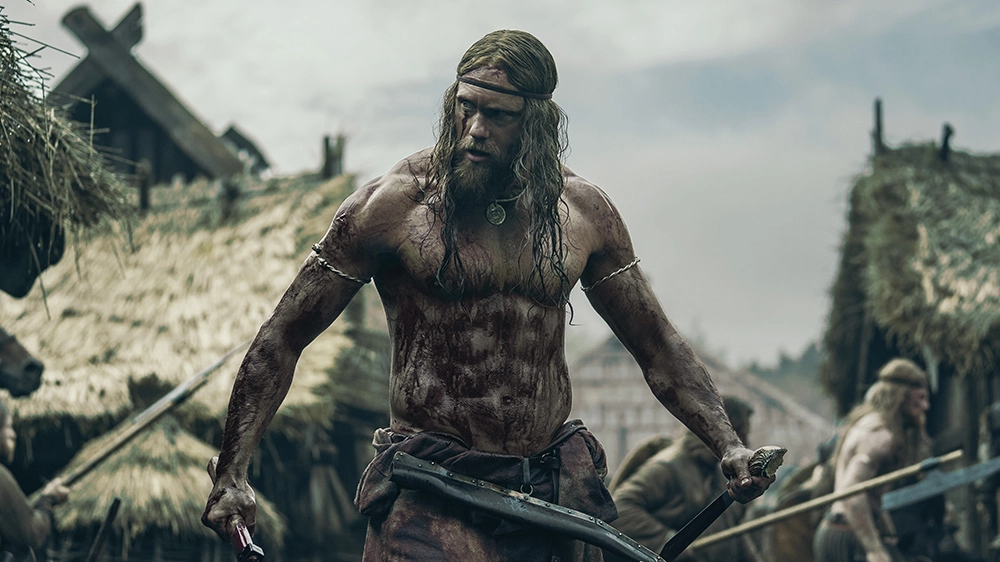
Awesome in multiple senses of the word, Robert Eggers’ The Northman is a swaggering, delirious monument to cinematic excess. It’s difficult to select a single scene that best encapsulates its bravura decadence—the moonlit swordfight against a skeleton? the hallucinogen-aided bonding session where father and son bark and howl like feral dogs? the fiery duel at the literal gates of Hell?—but I’m partial to the early sequence where a Viking warrior fells a helpless adversary with his axe and then, having already vanquished his hapless foe, bends down and sinks his teeth into the dying man’s neck.
This unchecked, animalistic ferocity is part of what animates The Northman, which is noteworthy for its sheer frenzy alone; on the surface, it seems to have been constructed purely to inspire giddy instant reactions along the lines of, “omg u guyz this movie FUCKS.” (A quick Twitter search confirms its success in this regard.) Yet look past the blood-soaked savagery on display, and you will discover that there is something more sophisticated at play here. I don’t mean to minimize the berserk (and berserker?) quality of the film’s content, or to imply that its straightforward themes of vengeance and obsession stretch beyond the obvious. What I mean is that, for all its gonzo energy, as a piece of aesthetic craftsmanship, The Northman is absolutely beautiful.
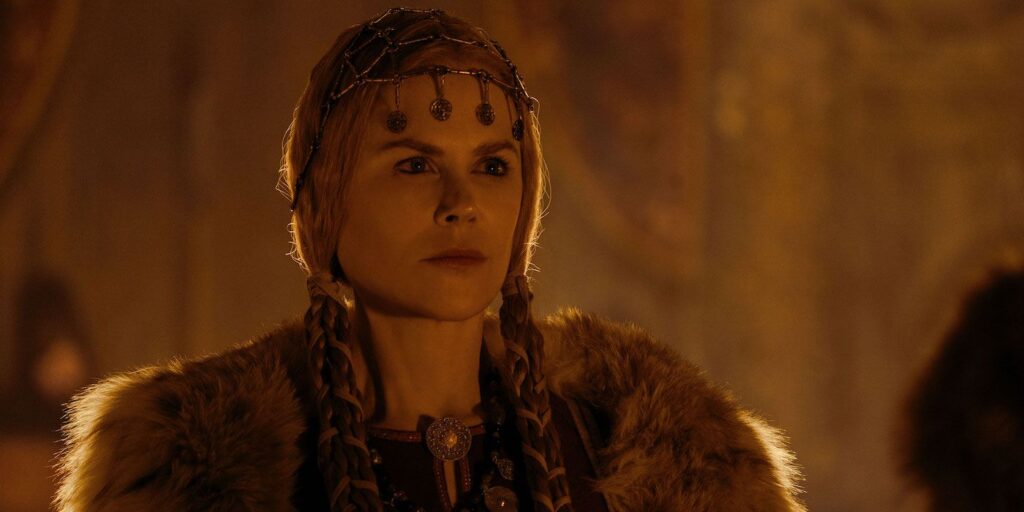
The collision of beauty and brutality is hardly unprecedented, neither in the annals of cinema nor in Eggers’ own work. His first two pictures, the sublime horror folktale The Witch and the punishing metaphysical two-hander The Lighthouse, both applied graceful technique to foreboding stories of danger and woe. Yet The Northman’s visual splendor is of a different character than those taut, spidery adventures. Here, Eggers has abandoned supple minimalism in favor of baroque opulence, without sacrificing any of the precision that informs his filmmaking. This is a big, bold movie that has been made with textured, intimate care. If it fucks, it fucks gorgeously.
That aforementioned neck-munching, for example, arrives during a ruthless invasion sequence in which Amleth (Alexander Skarsgård, sensibly cast) leads a band of bloodthirsty infidels into a meager settlement, effortlessly scaling its walls and laying waste to its citizenry. (When a sentry hurls a spear toward his tribe, Amleth snatches it in midair and promptly chucks it back at him, like the world’s deadliest dodgeball player.) The violence is rough and jagged, but it’s captured in a handful of smooth, silky takes, the camera gliding around the mayhem like a gore-curious anthropologist. Working again with the cinematographer Jarin Blaschke, Eggers appreciates the value of fluid tracking shots and smartly composed frames. All manner of unspeakable things happen in The Northman—at one point, a murderer extracts his victim’s heart, a valuable commodity to be used as leverage in a future negotiation—but they unfold with stark clarity and coherence.
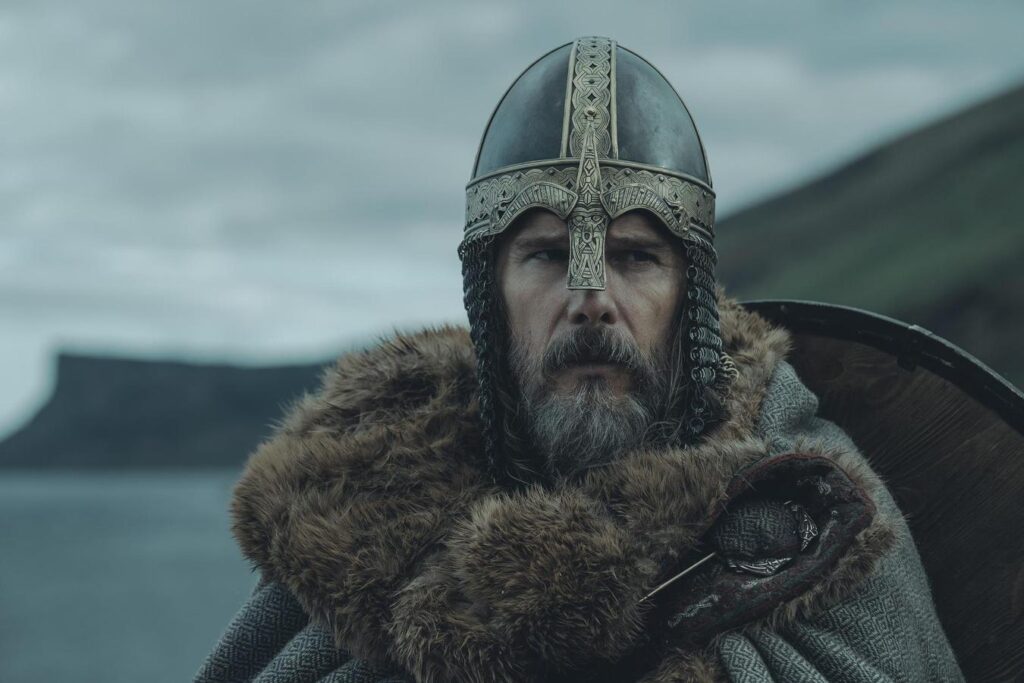
The plot that garnishes these lapidary set pieces is a familiar stew of quest narrative, Norse mythology, and Shakespeare. Amleth—and if you can’t discern what name those letters rearrange into, you should take a course in anagrams—opens the film as the crown prince of a thriving kingdom, one led by the brash, war-hungry Aurvandil (Ethan Hawke). Married to a beaming queen, Gudrún (Nicole Kidman), Aurvandil possesses a Beowulfian pride yet is also a devoted father, and he takes pains to school his son for his coming reign. Yet something quickly grows rotten in Iceland, and before long Aurvandil’s jealous brother, Fjölnir (a suitably menacing Claes Bang), slays the king, steals the queen, and leaves the young prince for dead. The fleeing Amleth (played as a child by Oscar Novak) instantly develops a mantra of retribution—“I will avenge you Father, I will save you Mother, I will kill you Fjölnir”—and the remainder of The Northman traces his lifelong mission to fulfill this three-pronged goal, charting its challenges and complications.
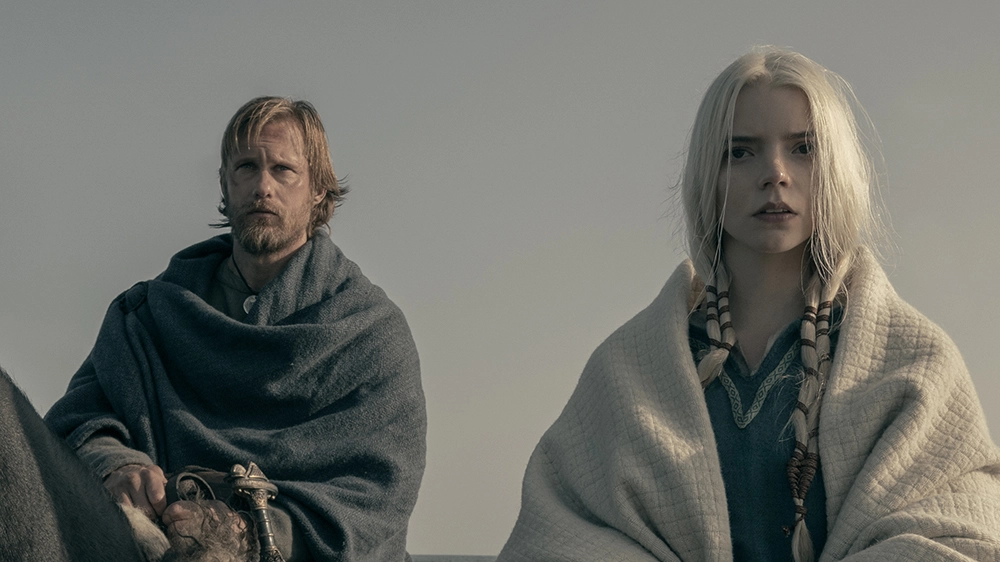
Structurally speaking, it’s pretty simple stuff, but the bluntness of the story affords Eggers room to embellish it with sly grace notes and flavorful flourishes. The dialogue, which he wrote with Sjón, is characteristically ornate, with an appropriately antiquated rhythm that never slips into stiffness or obscurity. (Certain lines are difficult to hear, though the vocals aren’t nearly as muffled as they were in The Lighthouse.) The production design (by Craig Lathrop) is simultaneously realistic and fantastical; the film underlines the grueling nature of Middle-Age life, yet its carefully appointed castles and huts are quite the opposite of drab. And Eggers refuses to allow the inherent ugliness of his subject matter to seep into his color scheme, which pops with bright blues and blazing oranges; a metaphorical vision of Amleth’s family tree pulsates with ethereal light, while a climactic battle on a volcano seems to be set amid the enveloping fires of Hell itself—which, of course, it is.
The lunacy of that climax demonstrates the extent of The Northman’s operatic ambition, which is a reward unto itself. In an era where big-budget tentpoles thrive on irony and self-reference, it’s gratifying to watch a thundering entertainment which exhibits the courage to dazzle audiences without flattering or winking at them. (Rumors of studio interference would appear to be unfounded.) The movie’s kinetic flights of fancy—Amleth’s (possibly imagined) skirmish with an animated corpse that wilts in the moonlight; his escape from bondage thanks to the aid of some persistent ravens; even a sporting contest involving a ball, some clubs, and a very angry opponent—may not exactly make sense, but they all tap into the film’s vein of unfettered fervor. Its nuts and bolts may be outrageous, but its sincerity is pure.
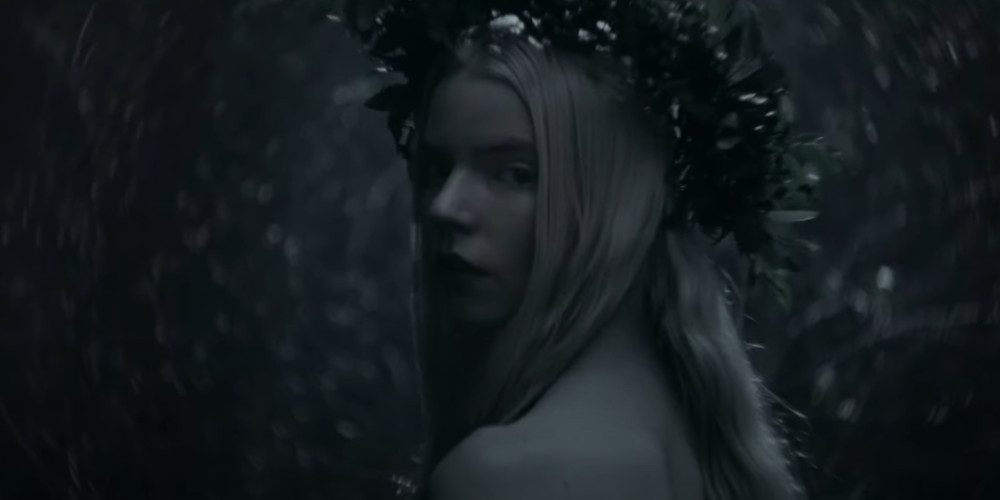
At the middle of everything is Skarsgård, who holds the center mainly by looking the part; with his looming frame and rippling torso, he slips into the bearskin convincingly. As an actor, emoting isn’t his strength, but he wisely doesn’t try to do too much, instead exploiting his physicality, which contrasts nicely against Bang’s slippery malevolence. Their snarling conflict might have risked nudging The Northman into chest-thumping displays of masculine puffery, but the movie actually derives its lasting intensity from its women. Gudrún spends much of the picture on the margins, an apparent token of male power, only to suddenly reclaim the stage with a seething, venomous monologue, one that Kidman delivers with delicious anger.
And then there is Olga, Amleth’s confidant, coconspirator, and eventual lover, who is played with hypnotic intelligence by Anya Taylor-Joy. “Your strength breaks men’s bones,” she tells Amleth; “I have the cunning to break their minds.” Yet there is more to Taylor-Joy’s performance than treacherous conniving. Armed with little more than her wits, her resolve, and her menstrual blood (just wait for it), Olga must cautiously navigate a perilous situation without yielding her autonomy. Taylor-Joy does more than just convey the character’s inner strength; she creates a complex emotional latticework of defiance, vulnerability, and desire. Amleth may literally thieve the bodily organs of his enemies. But it’s Olga’s shimmering fury that steals your own heart.
Grade: A-
Jeremy Beck is the editor-in-chief of MovieManifesto. He watches more movies and television than he probably should.
